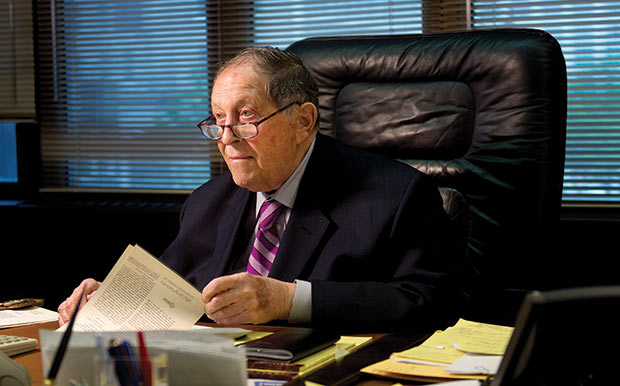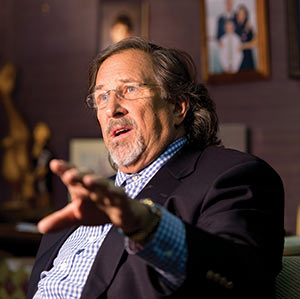New clients at 90
By: Eric Heisig//July 7, 2014//

One of the state’s longest-practicing attorneys has no interest in retiring

Irving Gaines was just 24 years old when he first argued a case before the Wisconsin Supreme Court.
That was 66 years ago.
Now 90, the lawyer who has practiced law in Milwaukee since he graduated from the University of Wisconsin Law School in 1947, still is accepting clients at his downtown Gaines Law Offices SC.
He said he continues to work because it keeps him mentally fit.
But push a little harder, and Gaines acknowledges that most of his friends and peers have passed away. He lost two law school classmates in the past six months.
“If I went to Florida now to visit,” he said, “there’s nobody for me to visit.”
Working is a way to feel vital, Gaines said.
“I like to talk to people. I like to stay involved,” he said. “I feel that I can help people that come in here with things they need to have done.”
Not ready to quit
John Wilcox, president-elect of the State Bar’s Senior Lawyers Division, said he sees more attorneys now practicing into their 70s and 80s. But it may not be because a larger percentage of them keep working. Rather, Wilcox said, the attorney population has grown, which means a small percentage could mean a lot more people.
“It’s more probably a factor of demographics than anything else,” Wilcox said, adding that many attorneys may not have the savings to fully retire.
But Gaines said he doesn’t need the money. He just wants “to be active.”
“I would not want to sit in my condominium and look at the four walls and turn on the TV and watch a soap opera,” he said. “I’m not interested in vegetating.”
Gaines is in his office every day.
“He reminds me of the old family doctor,” said retired Milwaukee federal bankruptcy Judge James Shapiro, who went up against Gaines in one of Shapiro’s first cases more than five decades ago and has referred clients to Gaines. “He’s the family lawyer.”

About a decade ago, Gaines and his son Jeffrey, who is a law partner with his father, talked about retirement. Those discussions have stopped, though, Jeffrey said, because Irving has made it clear he is not interested.
“Retirement hasn’t been an option, really,” Jeffrey said. “And as he’s gotten older, it’s become less of a relevant discussion because it really is what keeps him going.”
Irving — who continues to work with clients on real estate transactions, wills and estate planning — tells stories about practicing law in the 1950s and ’60s in Milwaukee that take on the tone of describing an extinct era.
“You have all this ‘one call that’s all’ Gruber and all the rest of those ads. We didn’t have that before,” he said. “You got your work because you were a good lawyer, not because you advertised.”
Irving said the practice of law was cordial.
“We might have some differences to argue about in court,” he said, “but out of court everyone was sociable.”
Shapiro, who was admitted to the state bar in 1956, said describing Irving as an “old timer” is apt.
“Times have changed,” Shapiro said. “There was a time when you practiced law, when the word of a lawyer meant something and they were practical.”
Waukesha attorney Ed Hannan started his career in the 1970s in the Plankinton Building in downtown Milwaukee. At the time, Irving had an office in the building with his then-law partner, David Saichek.
Hannan called Irving an old-school lawyer who would force his opponents to meet a high burden of proof.
“A lawyer like that,” Hannan said, “you have to respect.”
From the cavalry to the courtroom
Irving’s parents were insistent, he said, that all of their children be professionals, a benchmark his brother and sister also achieved. He said he didn’t have a particular reason to go to law school but liked history and politics.
“All I knew was that, probably from grade school on, I wanted to be a lawyer,” Irving said, laughing. “I can’t tell you why.”
In the midst of law school, Irving served a stint in the Army during World War II. He learned Hindustani, a prominent language in India, and was a translator in the Philippines and Japan as the war was winding down. He also was trained as part of the Army’s horse cavalry, though he never saw any combat.
He returned home to finish law school, and his first job was with Milwaukee attorney N. Paley Phillips, who had his own firm and was primarily a civil litigator. Phillips, Irving said, offered him “tremendous experience.”
“Whenever he was going to court,” Irving said, “I was there sitting second chair with him.”
Within a year, Irving was arguing before the Wisconsin Supreme Court on behalf of Paul Lawrence, a northern Wisconsin man who was serving a sentence of up to 35 years for incest. Lawrence had been arrested, convicted and sentenced in a matter of a few hours, Irving said, and that formed the basis of the appeal.
Sixty-six years later, Irving acknowledged his memory is pretty dim of that day in court, though he “was probably scared a little bit.” The court, in a 5-1 decision written by Justice Edward Fairchild, upheld Lawrence’s conviction.
Irving, however, said the case was 18 years before its time.
“If Miranda had been decided, he would have been released,” Irving said, referring to Miranda v. Arizona, a 1966 U.S. Supreme Court case that determined all defendants must be read their rights before being interrogated by police.
Irving left Phillips’ practice in 1952 and branched out on his own. He continued litigation, mostly working as a civil trial attorney. Throughout his career, Irving estimated he has completed hundreds of trials.
Jeffrey joined the practice in 1976 and the pair has worked together since. Jeffrey now does most of the litigation because, Irving said, he “had no desire to get into court” as he got older. Still, his name pops up on the occasional state or federal lawsuit.
“There are so many more judges,” Irving said, “you can’t know everyone.”
To see and be seen
Irving is a little slower than he used to be. He started using a walker a few years ago because of back problems and, in November, was sidelined because of heart surgery.
He was back in the office by January.
“Even though I was 90,” Irving said, “the doctor and everyone else considered I was a good risk.”
His desk, aside from papers, holds a telephone and Dictaphone, but no computer. Irving is a self-described “computer illiterate.” If he needs to do legal research, he looks over the shoulder of his secretary or goes to the Milwaukee County Courthouse.
Still, Irving can recite even the minutest detail about a case from more than six decades ago. He has published articles on the use of expert witnesses in trials and twice served as the president of the Wisconsin Association for Justice, then known as the Wisconsin Trial Lawyers Association.
He recently served nine years on the Milwaukee district committee for the Office of Lawyer Regulation.
“If I was married or living with a lady,” Irving said, “then I’m sure I’d probably want to do something different.”
Irving’s first wife died in 1979, and he divorced his second wife in 2005. He lives alone and still drives, a topic that makes Jeffrey wince.
Irving is involved in some community organizations, such as the North Division High School Alumni Association.
But work is his steady companion.
“It’s [about] continuing to see people and talk to people,” he said, “and get yourself challenged mentally.”
Irving’s son might struggle to picture himself doing the same thing at the age of 90, but, Jeffrey said, there is logic to it.
“What happens is you get older, your world gets a little smaller,” Jeffrey said. “You can’t do all the things that you think you can do or would like to do.
“This is one of the things you can do.”
Looking for the longest-practicing attorney
It’s safe to say Irving Gaines is one of the longest-practicing attorneys in Wisconsin, if not the longest.
There are others who graduated before him that still maintain their licenses, but none the Wisconsin Law Journal spoke to still were accepting new clients.
And none of the major legal organizations in the state seemed to track this. Suggestions from the State Bar of Wisconsin and the Milwaukee Bar Association yielded attorneys who were several years younger than Gaines. And others who graduated before him said they had long since retired.
And some, frankly, were right on the edge. For example, W.T. Doar, a 93-year-old attorney at Doar, Drill & Skow SC, New Richmond, said he is pretty much retired. He stops by the office, but only tends to one matter that he agreed to handle long before he stopped taking clients.
So if Irving isn’t the longest-practicing attorney in Wisconsin, he’s close.
Legal News
- Wisconsin attorney loses law license, ordered to pay $16K fine
- Former Wisconsin police officer charged with 5 bestiality felony counts
- Judge reject’s Trump’s bid for a new trial in $83.3 million E. Jean Carroll defamation case
- Dozens of deaths reveal risks of injecting sedatives into people restrained by police
- The Latest: Supreme Court arguments conclude in Trump immunity case
- Net neutrality restored as FCC votes to regulate internet providers
- Wisconsin Attorney General asks Congress to expand reproductive health services
- Attorney General Kaul releases update at three-year anniversary of clergy and faith leader abuse initiative
- State Bar leaders remain deeply divided over special purpose trust
- Former Wisconsin college chancellor fired over porn career is fighting to keep his faculty post
- Pecker says he pledged to be Trump campaign’s ‘eyes and ears’ during 2016 race
- A conservative quest to limit diversity programs gains momentum in states
WLJ People
- Power 30 Personal Injury Attorneys – Russell Nicolet
- Power 30 Personal Injury Attorneys – Benjamin Nicolet
- Power 30 Personal Injury Attorneys – Dustin T. Woehl
- Power 30 Personal Injury Attorneys – Katherine Metzger
- Power 30 Personal Injury Attorneys – Joseph Ryan
- Power 30 Personal Injury Attorneys – James M. Ryan
- Power 30 Personal Injury Attorneys – Dana Wachs
- Power 30 Personal Injury Attorneys – Mark L. Thomsen
- Power 30 Personal Injury Attorneys – Matthew Lein
- Power 30 Personal Injury Attorneys – Jeffrey A. Pitman
- Power 30 Personal Injury Attorneys – William Pemberton
- Power 30 Personal Injury Attorneys – Howard S. Sicula











